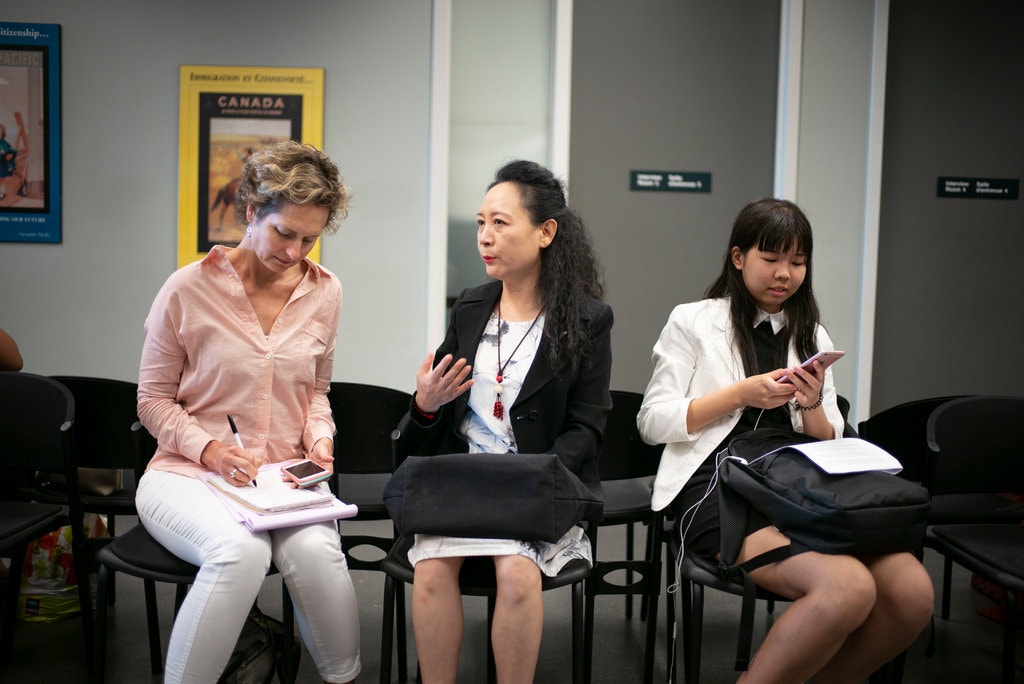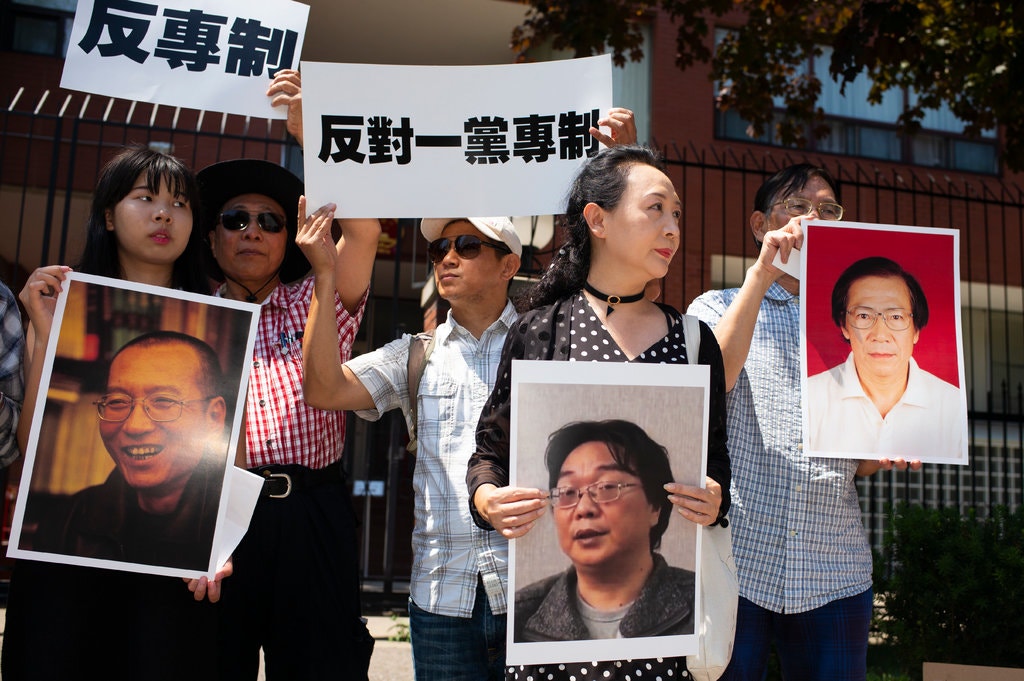CANADA LETTER
A Chinese Activist and the Smear Campaign
That Followed Her to Canada
By Catherine Porter
April 5, 2019
Often, covering Canada feels like reporting on many different countries. I get off the plane, and step into a different landscape, language and culture.
 |
|
Catherine Porter interviews Sheng Xue as she helps an asylum seeker in Toronto. Credit...IAN WILLMS FOR THE NEW YORK TIMES |
For the story of Sheng Xue, I simply drove 30 minutes west to her home in Mississauga, and stepped into the world of Chinese democracy activists, connected around the world by common cause and history.
They speak Mandarin, communicate through Listservs and Twitter, and reference events and people rarely noticed by mainstream English-language media.
I had come to learn more about the tactics the Chinese government reportedly used to silence Canadian activists deemed hostile to it. A confidential report by Amnesty International Canada had just been leaked, detailing the troubling experiences of 17 local activists. The person most cited was Sheng Xue.
[Read: Chinese Dissidents Feel Heat of Beijing’s Wrath. Even in Canada.]
When I met her, she opened files on her computer to show me online hookup ads listing her phone number and email address, blog posts with nude photos of her, pictures of a man standing out front of Parliament Hill holding a protest sign that called her a spy.
It seemed like the biggest public shaming campaign I’d never heard of.
I decided to see if I could get to the bottom of it. The investigation took me the better part of a year, in part because the accusations against her were tangled, and in Chinese, but also because I was reporting on a complicated subculture.
I started by hiring a Mandarin-speaking doctoral student, Emile Dirks, to help me research. Together, we dug through hundreds of blog posts, websites, essays circulated on various dissident Listservs, and books, some depicting Sheng Xue as a sexual pariah, a spy, a thief or a fraud.
 |
|
Sheng Xue at a rally for political prisoners in front of the Chinese consulate in Toronto. Credit...IAN WILLMS FOR THE NEW YORK TIMES |
 |
|
Sheng Xue with friends and supporters during her birthday party in Mississauga, Ontario. Credit...IAN WILLMS FOR THE NEW YORK TIMES |
My reporting went in many directions: One essay claimed a man had seen Sheng Xue meeting with a People’s Daily reporter late at night, casting suspicion on her as a spy. But when I tracked down the stated witness, he said it wasn’t true.
I interviewed a Chinese diplomat who defected to Australia, other dissidents across Canada and the United States, a radio host in Taiwan, a book publisher in Hong Kong.
We assembled a spreadsheet that stretched 25 pages.
As often happens in this job, many leads went nowhere. Although we dug up the registrations of most websites hosting lewd photos of Sheng Xue, we couldn’t track down the anonymous creators. Many of my emails, calls and letters went unanswered.
But others led to interviews. I met three of her main adversaries in person, and talked to a fourth over Skype, phone and email. (In all cases, I had a translator with me.) These adversaries see themselves as whistle-blowers, not attackers.
“All of her behavior has been exposed,” said Chen Yiran, a former close friend who accused Sheng Xue of pocketing a $100 donation and profiting from aiding “fake refugees” for kickbacks like a television.
“People like her use the banner of opposing the Communist Party, but there is no real difference between them and the Communists,” she said over tea. “Sometimes, they are even worse.”
One pattern that emerged was identity theft. Many of Sheng Xue’s adversaries told a strange story of someone posing as them online to spread more accusations against her.
Many experts, from academics to former intelligence officers and human rights campaigners, said it all reflected a Chinese Communist Party strategy of seeding and stirring division among the dissidents so they were in no position to present a real challenge to the party.
Predictably, the response to my story has been fierce and loud on Twitter, reflecting how fractious the overseas dissident community is. Many replies attacked Sheng Xue and the story, while some defended her.
It’s a debate transpiring almost entirely within the world of Chinese dissidents — a world most Canadians never enter, and one that the past year of reporting helped me begin to understand.
___
This week’s Trans Canada and Around The Times highlights were compiled by Canada correspondent Ian Austen.
Trans Canada
—Whether it’s a turning point or not, Prime Minister Justin Trudeau’s decision to expel Jody Wilson-Raybould and Jane Philpott from the Liberal party was another major moment in the political turmoil surrounding his government.
—“How am I supposed to teach about respect, tolerance and diversity to my students, many of whom are immigrant kids, when the government is asking me to give up who I am?” Dan Bilefsky was asked by an elementary schoolteacher in Montreal who would have to remove her Muslim head scarf or stall her career under proposed Quebec law.
—In the week that the federal government imposed carbon taxes on provinces that refused to put their own systems in place, we looked at the 40 countries that apply some sort of cost to carbon emissions — and how much of an impact the programs are having.
—By day, Toronto native Matt Walker tickles tiny worms while peering at them through microscopes as a neurobiologist at Columbia University in New York. At night he appears in an Off Broadway production as Max, “a hapless actor who cannot stop mugging for the audience while performing in a dusty whodunit.”
Around The Times
—In The New York Times magazine, Jim Rutenberg and Jonathan Mahler carefully dissect how Rupert Murdoch and his family have used their global media empire to destabilize democracies in North America, Europe and Australia.
—”Game of Thrones” is now in its final season. But fans who travel to Northern Ireland can still visit the spot where Melisandre gave birth to the shadow monster.
—”Try cooking 1,400 lamb chops to a perfect medium-rare at the same time, using nothing but sheet pans, Sterno and an upright aluminum cabinet on wheels called a hot box.” That’s among the challenges that confronted two writers found when they went into the world of caterers as cooks.
—Is Patagonia really “leaving the bros out in the cold” by cutting off sales of branded fleece vests to the financial and tech firms where they have become standard business dress? Vanessa Friedman found the reality is a bit more complicated.
We’d love your feedback on this newsletter. Please email your thoughts and suggestions to This email address is being protected from spambots. You need JavaScript enabled to view it.. And if you haven’t done so, please subscribe to the email newsletter version.
URL of the original artical:https://www.nytimes.com/2019/04/05/world/canada/sheng-xue-chinese-activist-smear-campaign.html
 English (UK)
English (UK)  中文(简体)
中文(简体)  中文(正體)
中文(正體) 
